Racial Profiling: An Argument
VerifiedAdded on 2023/04/20
|6
|1144
|290
AI Summary
This essay discusses racial profiling in schools, colleges, and universities in North America, its causes, effects, and consequences.
Contribute Materials
Your contribution can guide someone’s learning journey. Share your
documents today.
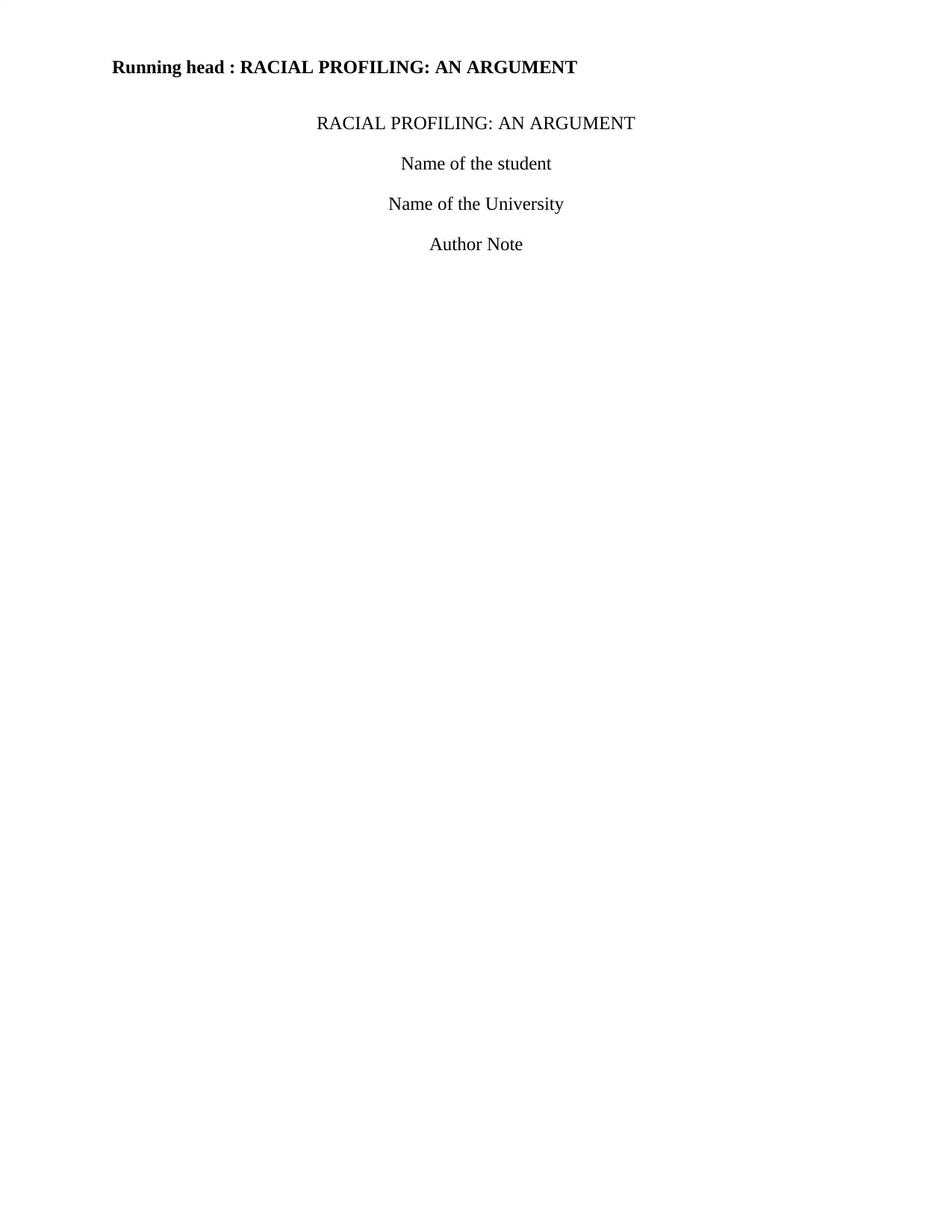
Running head : RACIAL PROFILING: AN ARGUMENT
RACIAL PROFILING: AN ARGUMENT
Name of the student
Name of the University
Author Note
RACIAL PROFILING: AN ARGUMENT
Name of the student
Name of the University
Author Note
Secure Best Marks with AI Grader
Need help grading? Try our AI Grader for instant feedback on your assignments.
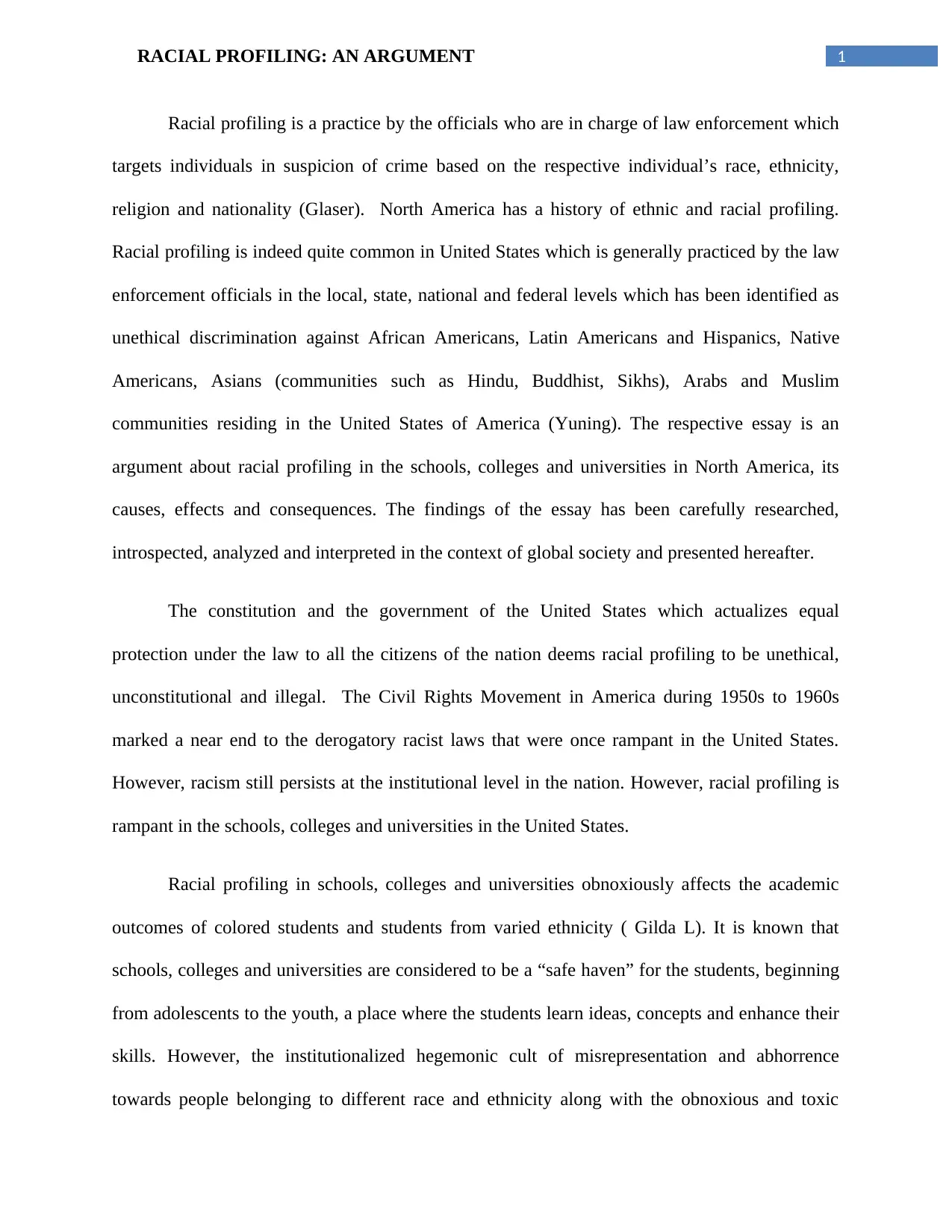
1RACIAL PROFILING: AN ARGUMENT
Racial profiling is a practice by the officials who are in charge of law enforcement which
targets individuals in suspicion of crime based on the respective individual’s race, ethnicity,
religion and nationality (Glaser). North America has a history of ethnic and racial profiling.
Racial profiling is indeed quite common in United States which is generally practiced by the law
enforcement officials in the local, state, national and federal levels which has been identified as
unethical discrimination against African Americans, Latin Americans and Hispanics, Native
Americans, Asians (communities such as Hindu, Buddhist, Sikhs), Arabs and Muslim
communities residing in the United States of America (Yuning). The respective essay is an
argument about racial profiling in the schools, colleges and universities in North America, its
causes, effects and consequences. The findings of the essay has been carefully researched,
introspected, analyzed and interpreted in the context of global society and presented hereafter.
The constitution and the government of the United States which actualizes equal
protection under the law to all the citizens of the nation deems racial profiling to be unethical,
unconstitutional and illegal. The Civil Rights Movement in America during 1950s to 1960s
marked a near end to the derogatory racist laws that were once rampant in the United States.
However, racism still persists at the institutional level in the nation. However, racial profiling is
rampant in the schools, colleges and universities in the United States.
Racial profiling in schools, colleges and universities obnoxiously affects the academic
outcomes of colored students and students from varied ethnicity ( Gilda L). It is known that
schools, colleges and universities are considered to be a “safe haven” for the students, beginning
from adolescents to the youth, a place where the students learn ideas, concepts and enhance their
skills. However, the institutionalized hegemonic cult of misrepresentation and abhorrence
towards people belonging to different race and ethnicity along with the obnoxious and toxic
Racial profiling is a practice by the officials who are in charge of law enforcement which
targets individuals in suspicion of crime based on the respective individual’s race, ethnicity,
religion and nationality (Glaser). North America has a history of ethnic and racial profiling.
Racial profiling is indeed quite common in United States which is generally practiced by the law
enforcement officials in the local, state, national and federal levels which has been identified as
unethical discrimination against African Americans, Latin Americans and Hispanics, Native
Americans, Asians (communities such as Hindu, Buddhist, Sikhs), Arabs and Muslim
communities residing in the United States of America (Yuning). The respective essay is an
argument about racial profiling in the schools, colleges and universities in North America, its
causes, effects and consequences. The findings of the essay has been carefully researched,
introspected, analyzed and interpreted in the context of global society and presented hereafter.
The constitution and the government of the United States which actualizes equal
protection under the law to all the citizens of the nation deems racial profiling to be unethical,
unconstitutional and illegal. The Civil Rights Movement in America during 1950s to 1960s
marked a near end to the derogatory racist laws that were once rampant in the United States.
However, racism still persists at the institutional level in the nation. However, racial profiling is
rampant in the schools, colleges and universities in the United States.
Racial profiling in schools, colleges and universities obnoxiously affects the academic
outcomes of colored students and students from varied ethnicity ( Gilda L). It is known that
schools, colleges and universities are considered to be a “safe haven” for the students, beginning
from adolescents to the youth, a place where the students learn ideas, concepts and enhance their
skills. However, the institutionalized hegemonic cult of misrepresentation and abhorrence
towards people belonging to different race and ethnicity along with the obnoxious and toxic
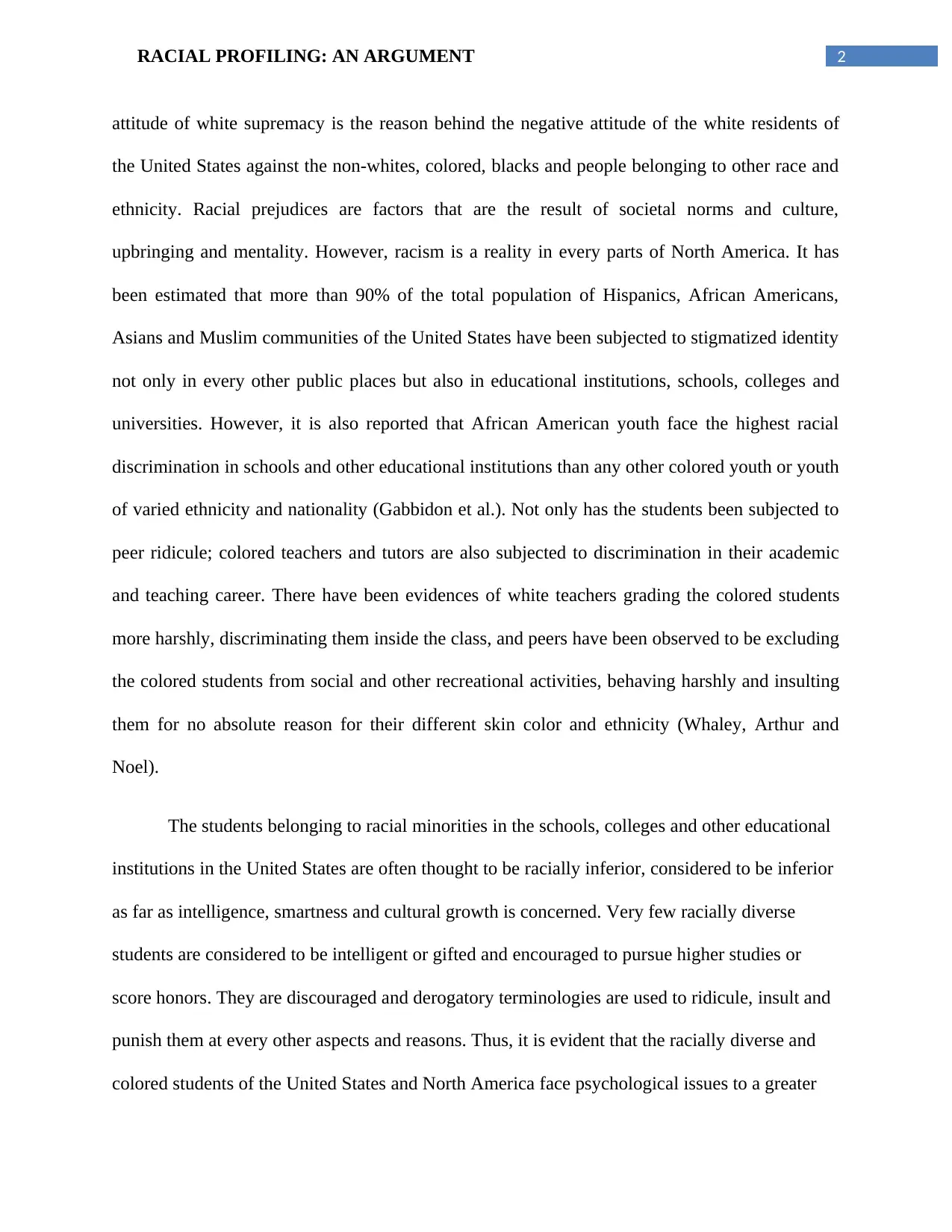
2RACIAL PROFILING: AN ARGUMENT
attitude of white supremacy is the reason behind the negative attitude of the white residents of
the United States against the non-whites, colored, blacks and people belonging to other race and
ethnicity. Racial prejudices are factors that are the result of societal norms and culture,
upbringing and mentality. However, racism is a reality in every parts of North America. It has
been estimated that more than 90% of the total population of Hispanics, African Americans,
Asians and Muslim communities of the United States have been subjected to stigmatized identity
not only in every other public places but also in educational institutions, schools, colleges and
universities. However, it is also reported that African American youth face the highest racial
discrimination in schools and other educational institutions than any other colored youth or youth
of varied ethnicity and nationality (Gabbidon et al.). Not only has the students been subjected to
peer ridicule; colored teachers and tutors are also subjected to discrimination in their academic
and teaching career. There have been evidences of white teachers grading the colored students
more harshly, discriminating them inside the class, and peers have been observed to be excluding
the colored students from social and other recreational activities, behaving harshly and insulting
them for no absolute reason for their different skin color and ethnicity (Whaley, Arthur and
Noel).
The students belonging to racial minorities in the schools, colleges and other educational
institutions in the United States are often thought to be racially inferior, considered to be inferior
as far as intelligence, smartness and cultural growth is concerned. Very few racially diverse
students are considered to be intelligent or gifted and encouraged to pursue higher studies or
score honors. They are discouraged and derogatory terminologies are used to ridicule, insult and
punish them at every other aspects and reasons. Thus, it is evident that the racially diverse and
colored students of the United States and North America face psychological issues to a greater
attitude of white supremacy is the reason behind the negative attitude of the white residents of
the United States against the non-whites, colored, blacks and people belonging to other race and
ethnicity. Racial prejudices are factors that are the result of societal norms and culture,
upbringing and mentality. However, racism is a reality in every parts of North America. It has
been estimated that more than 90% of the total population of Hispanics, African Americans,
Asians and Muslim communities of the United States have been subjected to stigmatized identity
not only in every other public places but also in educational institutions, schools, colleges and
universities. However, it is also reported that African American youth face the highest racial
discrimination in schools and other educational institutions than any other colored youth or youth
of varied ethnicity and nationality (Gabbidon et al.). Not only has the students been subjected to
peer ridicule; colored teachers and tutors are also subjected to discrimination in their academic
and teaching career. There have been evidences of white teachers grading the colored students
more harshly, discriminating them inside the class, and peers have been observed to be excluding
the colored students from social and other recreational activities, behaving harshly and insulting
them for no absolute reason for their different skin color and ethnicity (Whaley, Arthur and
Noel).
The students belonging to racial minorities in the schools, colleges and other educational
institutions in the United States are often thought to be racially inferior, considered to be inferior
as far as intelligence, smartness and cultural growth is concerned. Very few racially diverse
students are considered to be intelligent or gifted and encouraged to pursue higher studies or
score honors. They are discouraged and derogatory terminologies are used to ridicule, insult and
punish them at every other aspects and reasons. Thus, it is evident that the racially diverse and
colored students of the United States and North America face psychological issues to a greater
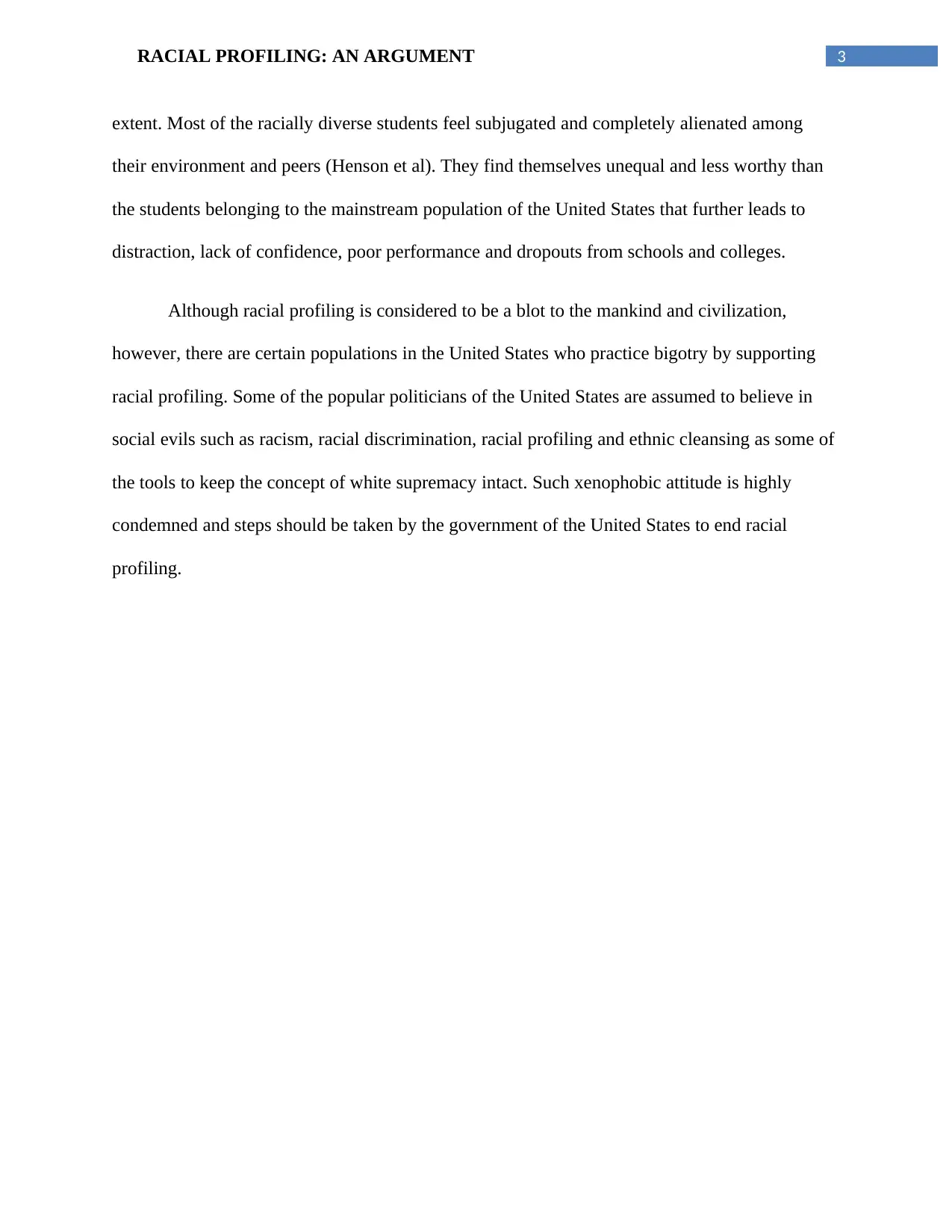
3RACIAL PROFILING: AN ARGUMENT
extent. Most of the racially diverse students feel subjugated and completely alienated among
their environment and peers (Henson et al). They find themselves unequal and less worthy than
the students belonging to the mainstream population of the United States that further leads to
distraction, lack of confidence, poor performance and dropouts from schools and colleges.
Although racial profiling is considered to be a blot to the mankind and civilization,
however, there are certain populations in the United States who practice bigotry by supporting
racial profiling. Some of the popular politicians of the United States are assumed to believe in
social evils such as racism, racial discrimination, racial profiling and ethnic cleansing as some of
the tools to keep the concept of white supremacy intact. Such xenophobic attitude is highly
condemned and steps should be taken by the government of the United States to end racial
profiling.
extent. Most of the racially diverse students feel subjugated and completely alienated among
their environment and peers (Henson et al). They find themselves unequal and less worthy than
the students belonging to the mainstream population of the United States that further leads to
distraction, lack of confidence, poor performance and dropouts from schools and colleges.
Although racial profiling is considered to be a blot to the mankind and civilization,
however, there are certain populations in the United States who practice bigotry by supporting
racial profiling. Some of the popular politicians of the United States are assumed to believe in
social evils such as racism, racial discrimination, racial profiling and ethnic cleansing as some of
the tools to keep the concept of white supremacy intact. Such xenophobic attitude is highly
condemned and steps should be taken by the government of the United States to end racial
profiling.
Secure Best Marks with AI Grader
Need help grading? Try our AI Grader for instant feedback on your assignments.
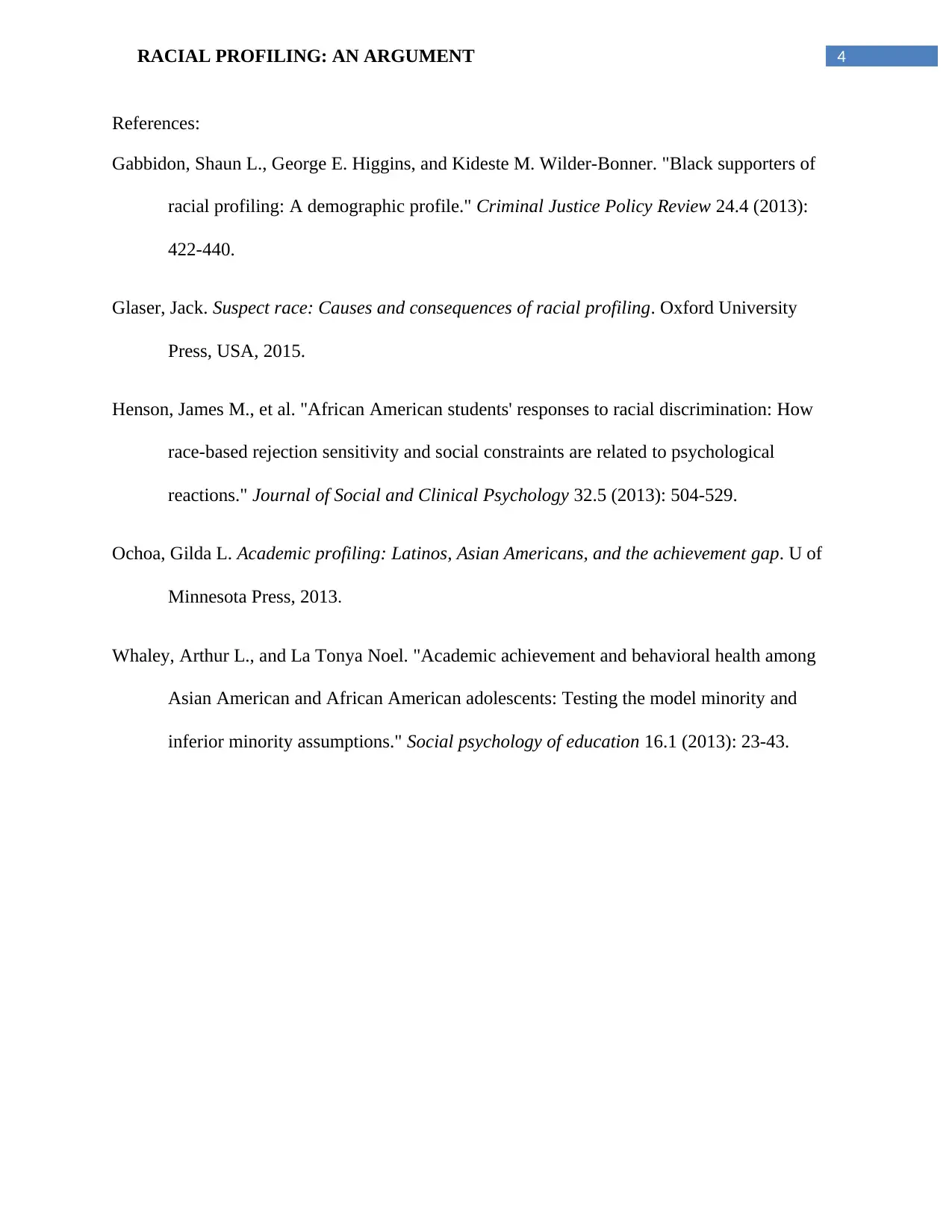
4RACIAL PROFILING: AN ARGUMENT
References:
Gabbidon, Shaun L., George E. Higgins, and Kideste M. Wilder-Bonner. "Black supporters of
racial profiling: A demographic profile." Criminal Justice Policy Review 24.4 (2013):
422-440.
Glaser, Jack. Suspect race: Causes and consequences of racial profiling. Oxford University
Press, USA, 2015.
Henson, James M., et al. "African American students' responses to racial discrimination: How
race-based rejection sensitivity and social constraints are related to psychological
reactions." Journal of Social and Clinical Psychology 32.5 (2013): 504-529.
Ochoa, Gilda L. Academic profiling: Latinos, Asian Americans, and the achievement gap. U of
Minnesota Press, 2013.
Whaley, Arthur L., and La Tonya Noel. "Academic achievement and behavioral health among
Asian American and African American adolescents: Testing the model minority and
inferior minority assumptions." Social psychology of education 16.1 (2013): 23-43.
References:
Gabbidon, Shaun L., George E. Higgins, and Kideste M. Wilder-Bonner. "Black supporters of
racial profiling: A demographic profile." Criminal Justice Policy Review 24.4 (2013):
422-440.
Glaser, Jack. Suspect race: Causes and consequences of racial profiling. Oxford University
Press, USA, 2015.
Henson, James M., et al. "African American students' responses to racial discrimination: How
race-based rejection sensitivity and social constraints are related to psychological
reactions." Journal of Social and Clinical Psychology 32.5 (2013): 504-529.
Ochoa, Gilda L. Academic profiling: Latinos, Asian Americans, and the achievement gap. U of
Minnesota Press, 2013.
Whaley, Arthur L., and La Tonya Noel. "Academic achievement and behavioral health among
Asian American and African American adolescents: Testing the model minority and
inferior minority assumptions." Social psychology of education 16.1 (2013): 23-43.
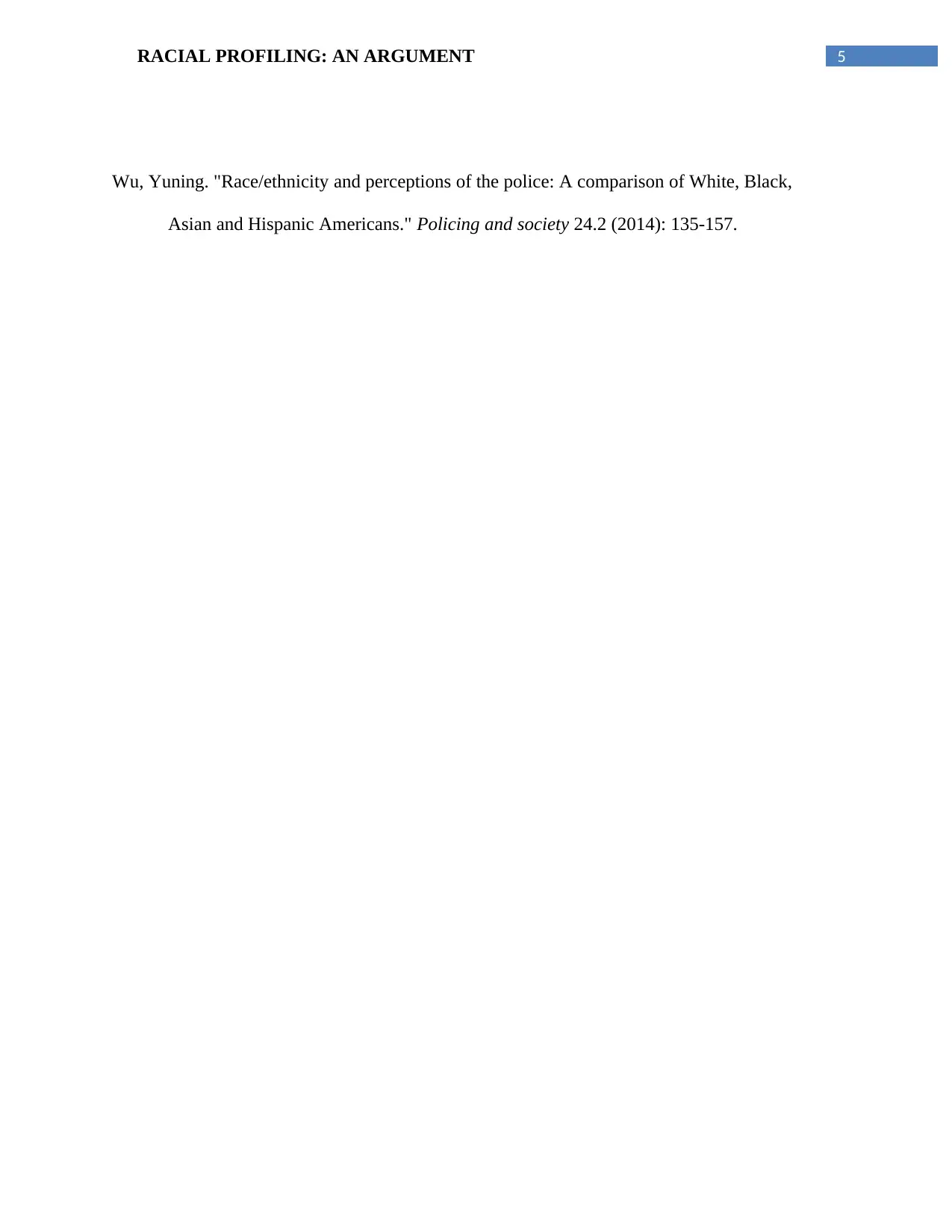
5RACIAL PROFILING: AN ARGUMENT
Wu, Yuning. "Race/ethnicity and perceptions of the police: A comparison of White, Black,
Asian and Hispanic Americans." Policing and society 24.2 (2014): 135-157.
Wu, Yuning. "Race/ethnicity and perceptions of the police: A comparison of White, Black,
Asian and Hispanic Americans." Policing and society 24.2 (2014): 135-157.
1 out of 6
Related Documents
Your All-in-One AI-Powered Toolkit for Academic Success.
+13062052269
info@desklib.com
Available 24*7 on WhatsApp / Email
![[object Object]](/_next/static/media/star-bottom.7253800d.svg)
Unlock your academic potential
© 2024 | Zucol Services PVT LTD | All rights reserved.





